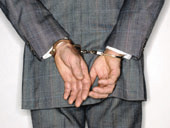The total amount of fraud in 2011 topped £3.5 billion – a record year – according to KPMG’s Fraud Barometer, as Britons across the country continue to struggle with tough economic conditions. Some £2.5 billion of fraud was recorded during the second half of the year – including five large fraud cases of more than £50 million each coming to court.
One rogue trader case, alone (which has not yet been tried), accounted for £1.3 billion and even without its inclusion, the six months to December 2011 would still have seen the largest amount of fraud ever recorded by KPMG in a six month period.
Hitesh Patel, KPMG Forensic Partner said: “2011 was an extraordinary year for fraudsters – as demonstrated by the record losses through large-scale cases of fraud which dominated the headlines. The economic uncertainty has been the double edged sword behind these numbers: companies and government agencies have rooted out more fraud through implementing austerity measures and operational changes while at the same time the pressures on individuals as a result of the downturn continues to act as a catalyst for more fraud being perpetrated. These figures represent the thin edge of a much bigger wedge.”
Government and the public purse continue to be a target for fraudsters, with the sector having had the highest number of cases (68) recorded to the value of £1,097,979,711.
Hitesh added: “At a time when the country is battling with a huge deficit the dual assault on social welfare and infrastructure budgets is far from a victimless crime. It is a problem that affects us all as funds are deprived from the front line leading to higher levels of taxation, insurance costs and prices for products and services.”
Despite financial institutions having implemented leading edge technologies and strategies to combat fraud and money laundering, they continue to be under relentless attack. The audit firm’s analysis shows this is largely from professional criminals, but in some cases insiders and customers alike, with 59 cases worth £1,527,476,853. But as customers increasingly move to online and mobile banking for convenience, the banks are working hard to ensure modern technology platforms remain secure. As the largest perpetrators of fraud, professional criminals accounted for 98 cases totalling £1.4 billion worth of economic crime. They have adapted quicker than most to exploit financially vulnerable individuals and organisations as a result of the economic downturn.
Hitesh said: “Their illegal activities have a corrosive impact on the civil society. The proceeds from white collar crime such as sale of counterfeit goods and financial fraud are often redeployed to more serious nefarious activities such as human and drugs trafficking and terrorism among others.” According to the Barometer, the past six months have witnessed a colourful portfolio of fraudulent acts, often via the digital world with ‘business as usual’ phishing and online banking fraud – to ever more creative and colourful investment schemes drawing in vulnerable investors.
One “too good to be true” scam revolved around a fine wine and whisky investment scheme worth £30 million where investors were convinced that the alternative investments would yield better returns. The reality was little more than a “Ponzi” type-fraud offering investors returns of 110 per cent over three-months.
Given the trust and corporate guardianship placed in their hands, fraud by management accounted for 57 cases during 2011 with a value of £729,330,009 – an increase of 74 per cent on the previous year. The climb in value is emphasised with news that the number of actual cases stayed roughly the same. It would appear that everyone, management included, is trying to “get by” during the economic gloom.
Management often inflict the greatest damage to an organisation as they are able to operate fraudulently with greater ease by virtue of the trust and authority placed in them and their ability to conceal their tracks more convincingly. One case which accounted for £380 million, involved the owner of a hedge fund who was accused of improperly inflating its reported assets following a series of fraudulent transactions, after the fund collapsed in the aftermath of the recession. Hitesh Patel added: “Sadly due to the current economic circumstances the forecast is that the situation will get worse before it gets better. It is important that organisations don’t become myopic on this point and ensure they have robust prevention and detection mechanisms so that they don’t lose value through the back door that they have worked so hard to preserve through these difficult times.”
Methodology:
KPMG’s Fraud Barometer has been running for 25 years, and considers major fraud cases being heard in the UK’s Crown Courts, where charges are in excess of £100,000.










